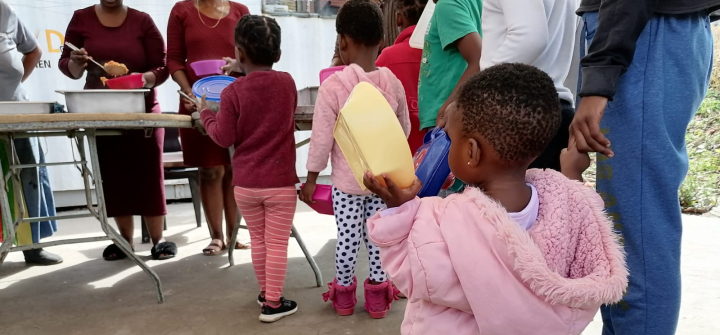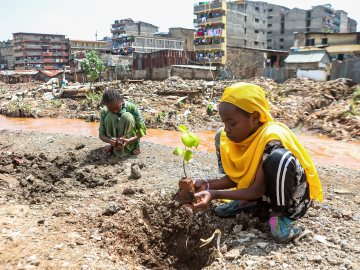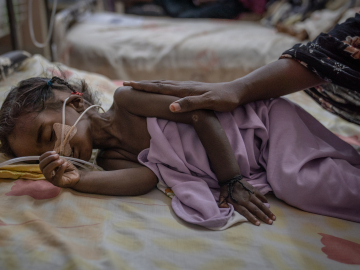A South African Soup Kitchen Is Bringing Relief to Caregivers
ALEXANDRA, South Africa—On a rainy Friday morning in this township—part of the Johannesburg metro area—women who volunteer at the Foundation for Special Needs Children & Youth Development (FSNC&YD) gathered outside a white shipping container that has been converted into a kitchen.
Among them is Aletta Seima—who, like her colleagues, is unemployed and relies on government assistance to meet some of her children’s needs. Seima, who worked as a cleaner until the beginning of the lockdown in March 2020, is one of the ~64 million women around the world who lost their job after the pandemic hit. After losing her job, Seima registered for assistance to supplement the salary of her husband, who had become the sole breadwinner.
Adjusting to her new reality was not an easy task for Seima, whose children—ages 16 and 9 years, and 18 months old—are now part of the 13.2 million+ children under age 17 reportedly receiving the CSG, a South African government social relief program, by November 2022.
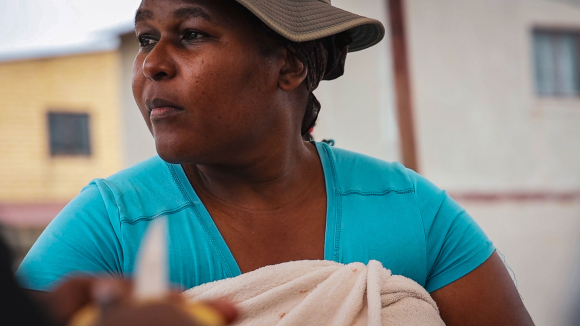
Aletta Seima is grateful to be volunteering at the Foundation for Special Needs Children & Youth Development soup kitchen which helps her supplement the child support grant that she receives for her children. Marcia Zali
During the pandemic’s first wave, up to 19% of children in the country went hungry for a period of seven days, with children from urban areas especially hard hit; hunger rates ranged from 13.76% to 18.6% during subsequent waves, as a study examining child hunger at the height of the COVID-19 pandemic in 2020 determined. Now, over half of South Africa’s estimated 20 million under the age of 18 receive the CSG.
Social relief for struggling caregivers
To qualify for the CSG, which now amounts to ZAR500 ($27), an unmarried mother/caregiver must earn no more than ZAR57,600 ($3,089) per year; married applicants must earn no more than a combined ZAR115,200 ($6,177) per year. And more than a third of all primary caregivers in the country are unemployed women, relying on the CSG as their only means to cover their children’s basic needs like food, clothing, education, and transport.
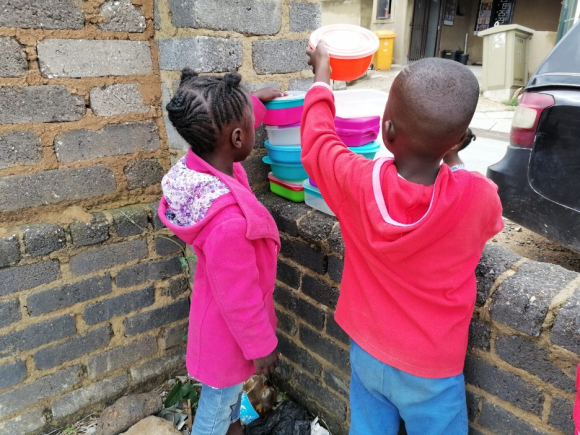
Ready for their meals: Alexandra township children stack up their lunch boxes as they wait for the soup kitchen to be open. Marcia Zali
The unemployment rate is especially high for Black women—nearly 40% in the second quarter of 2023, compared to only 10.2% of white women.
“It was very difficult to rely on a single income from my husband,” Seima said as she recalled how their lives had suddenly changed, adding that “the grant money helps a lot, you are able to patch here and there with it. I pay their school fees and transport. I buy groceries with the remaining money. I also buy diapers and formula for the baby.”
She worries, however, that her eldest daughter will soon be ineligible to receive the grant, when she turns 18. Seima hopes to find a job before that happens.
Why CSG matters
The CSG grant isn’t enough to lift a family above the food poverty line—based on the minimum nutritional requirements of 2,100 kilocalories per person per day, according to the University of Cape Town’s (UCT) Children’s Institute. That means that children who rely on it are not getting adequate nutrition—leaving mothers anxious about making sure that their children are fed, as a 2020 research report commissioned by Black Sash, an advocacy organisation, confirmed. The report determined that food insecurity resulted in high rates of child malnutrition and caregivers were struggling emotionally as a result—sometimes forced to choose between food and education for their children. Some caregivers opted to not eat so that their children could have whatever food was available.
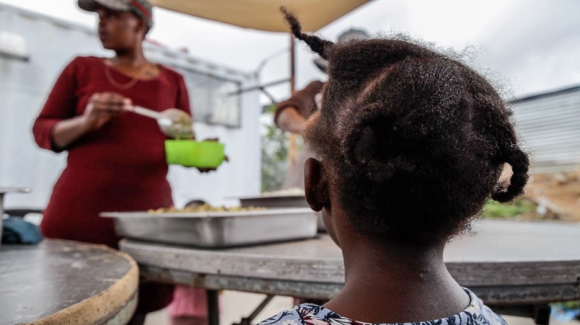
Soup kitchen tries to meet nutritional needs of children from impoverished families in Alexandra township. Marcia Zali
“I only have supper if I did not have lunch; I don’t usually eat supper because I have to save the food for my daughter,” said one mother interviewed for the study.
When caregivers struggle to put food on the table, it has detrimental impacts on the health and well-being of children. The Grow Great Campaign reports that one in four South African children under the age of 5 endure stunting—prolonged under-nutrition that affects a child’s physical and brain development. The consequences of stunting extend beyond childhood, associated with delayed start at school, not being able to academically excel, and decreased earnings, per the World Bank. In South Africa, up to 27% of children are stunted and at risk of not reaching their full potential or making a meaningful contribution to the country’s economy in adulthood because of stunting.
“Because of the complex interplay of the drivers of stunting, the causes of stunting cannot be addressed in isolation, and require a multisectoral approach,” said Nicola Eley, deputy executive director of the Grow Great Campaign, which aims to end stunting by 2030.
Different approaches to support caregivers and children
The Grow Great campaign is also running community-based surveys to profile the nutritional status of South African children; the collected data will be used to advocate for programs and policies to help children thrive. And, alongside other NGOs, Grow Great is calling for the South African government to increase the CSG, and to introduce a Maternity Support Grant—“not a new grant, but an extension of the CSG into pregnancy,” Eley explained—to help address hunger among pregnant women, improve pregnancy outcomes, and prevent malnutrition before children are even born.
Pregnant and lactating women are protected from being discriminated against unfair labour practices under section 26 of the Amended Basic Employment Act, which says employers must provide suitable alternative employment and conditions during pregnancy and for up to six months postpartum. Yet pregnant women—especially those working in informal and sometimes unregulated jobs—still find themselves unable to work or earn as they used to during and after their pregnancies. For example, a study looking at maternity protection for non-standard workers, particularly domestic workers, found that they had difficulty accessing maternity leave benefits.
A meal a day
After realizing the high levels of hunger in his community of Alexandra township, Vusi Msomi, a retired nurse and the founder of FSNC&YD, decided to take a stand to help his neighbors. Initially, he started a mechatronics project for children with special needs, but upon realizing that other children from the community would also line up to get a meal, he started a community kitchen.
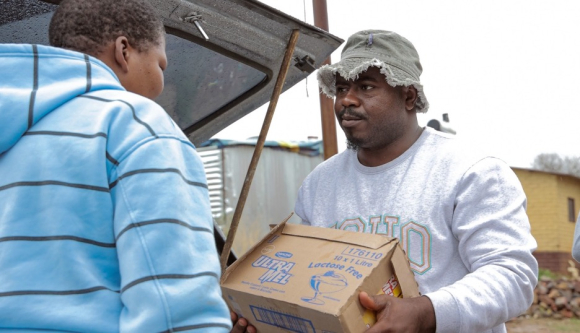
Vusi Msomi hopes the community kitchen he founded will receive the financial support it needs to provide at least one daily meal to alleviate hunger in his community. Marcia Zali
Nearly six years later, the kitchen now provides meals at least twice a week to children ages 2 and older, plus adults. The kitchen gets donations from local businesses, individuals, and the food bank, which is run by the Believers Care Society on behalf of the Gauteng province social services department. While this makes a difference, Msomi says it is not enough to address the hunger in the community—especially after the pandemic started.
“COVID-19 crushed us so hard that a lot of companies stopped supporting NGOs,” Msomi said. “Before then we operated from Monday to Friday, but we need more help and more sponsors to be able to cater for the kids from Monday to Friday like we used to.”
On this particular Friday, the plan was to cook vegetables with rice but an unexpected phone call from the local Shoprite came at the right time.
“The manager at Shoprite just called me to come and collect some bread from the supermarket. This is great because the ladies will be able to prepare sandwiches for today and the cooked meal will be served on Saturday,” said Msomi.
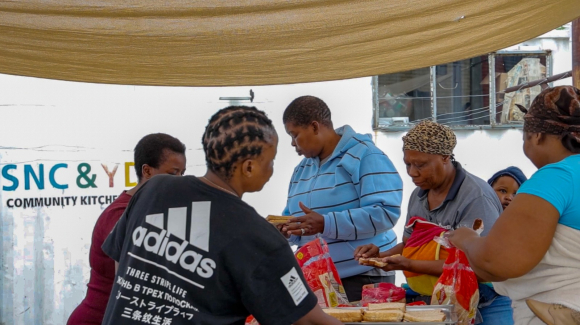
A group of unemployed mothers volunteer at a community soup kitchen that helps them feed their children. Marcia Zali
For him, every donation counts, because he knows that the unemployed women who volunteer at the kitchen rely on the CSG to feed their young children. After all the children and adults have been fed, Msomi allows the volunteers to take the leftovers home, which helps them feed their families even on the days when the kitchen is closed.
With enough funding, women like Seima would be able to take food home daily instead of twice a week.
The research for this article was supported by the Early Childhood Global Reporting fellowship from the Dart Center for Journalism and Trauma, a project of Columbia University.
Join the 50,000+ subscribers in 170+ countries who rely on Global Health NOW summaries and exclusive articles for the latest public health news. Sign up for our free weekday newsletter, and please share the link with friends and colleagues.
Children from Alexandra township, South Africa line up to collect their meals from the Foundation for Special Needs Children & Youth Development soup kitchen. Marcia Zali

